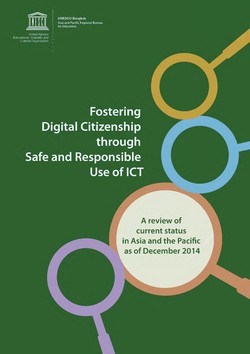Fostering Digital Citizenship through Safe and Responsible Use of ICT: A review of current status in Asia and the Pacific as of December 2014
The proliferation and emergence of ICT has fundamentally changed the way in which society operates. The increasingly ubiquitous nature of ICT has also inevitably caused it to become indispensable as part of daily life and a basic building block of modern society. When used effectively and appropriately, the benefits of ICT are boundless, enabling inclusive and sustainable human development by providing people not only with access to information and services but also expending opportunities to participate in and contribute to the knowledge economy.
Despite the affordances of ICT, the widespread use of ICT at present has brought about a range of social and ethical issues from online safety and security, misuse of information, and to health and mental hazard. Therefore, more so than ever, there is an urgent need to address and mitigate the risks associated with ICT use while simultaneously exploiting the opportunities afforded by these technologies. In view of the present situation, it is of paramount importance that young digital citizens equip themselves with appropriate knowledge, skills, and attitude to leverage and enjoy the potential benefits of ICTs while being resilient to the risks. Furthermore, schools, teachers, parents/ guardians, policy makers, industry players, and other key stakeholders are encouraged to adopt a proactive approach towards fostering a favourable environment to encourage responsible and safe use of ICT among children and youth.
In this regard, UNESCO Bangkok has been undertaking the “Fostering Digital Citizenship through Safe and Responsible Use of ICT” Project in partnership with Intel. It aims to promote policy dialogue on the issues of the ethical, safe, and responsible use of ICT and in building the education sector’s capacity in fostering digital citizenship among children.
As part of this project, the present publication, “Fostering Digital Citizenship through Safe and Responsible Use of ICT: A review of current status in Asia and the Pacific as of December 2014”, examines various interventions to address issues concerning cybersafety, rights, and wellness. Triggered by presentations and information shared through an expert meeting at Nanyang Technological University in Singapore in March 2014, the publication provides a synthesis of information gathered from a desk review of various policy responses, programmes, and initiatives implemented by governments, international organizations, civil society, and the private sector. The report ends with a preliminary set of recommendations with regards to policy, research, education, and partnerships. It is hoped that the report can provide an insight into the current status of digital citizenship in the region and consequently highlight the importance of maintaining a conscious balance of opportunities and risks when dealing with ICT.
A more in-depth review of national policy responses and initiatives is currently being conducted to establish a clearer understanding of the various legislation/ regulations, national curriculum, and other educational initiatives being implemented. It intends to identify the gaps for both policy and practices in promoting children’s safe and responsible use of ICT in the region. This publication is expected to be available at the latter part of the year.



